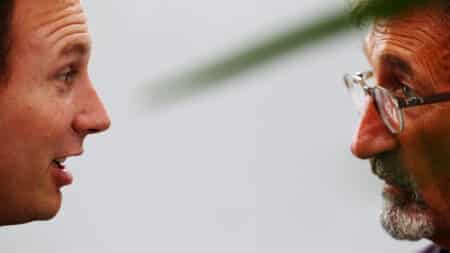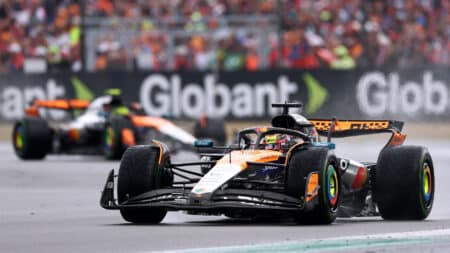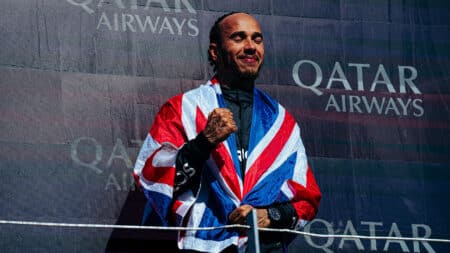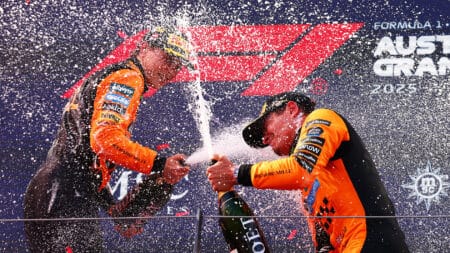
Horner's departure shows age of the maverick F1 boss is over
Christian Horner has now left Red Bull, the last of a certain breed of F1 team principal
There’s nothing quite like the Race of Remembrance, a race organised by Mission Motorsport each year at Anglesey on Remembrance weekend. The Armed Forces charity brings together 40 teams and more than 70 of its beneficiaries for one 12-hour race across the Saturday and Sunday. Nick Trott and Andrew Frankel ‘contested’ the race – if that’s the right word – last November with former servicemen Andy Jones and James Vice, as regular readers will have seen in the January issue of this year. This is their story.
Yes, I knew it was ‘a good cause’, but so too did I know it was a free skid after a thin year of racing, with a few old chums who’d also be taking part. I also knew plenty who’d done it before and said it had been one of the best weekends of their year.
I’d done my homework, particularly on team-mate Paul Vice – Vicey to one and all – and was fascinated to meet someone described as the most injured man to survive Afghanistan – and intrigued to meet the other man with whom Nick and I would be sharing the car, paratrooper Andy Jones of whom I knew nothing. But that was as far as it went.
Up until that weekend, the sufferings of such people were just headlines in newspapers, to be consumed with tea and toast on a Sunday morning before going to the pub. Even when I met them I didn’t really connect. Vicey and Andy appeared fit and well, the former confident and raring to get behind the wheel, the latter quieter but friendly and keen to learn before their first race.
Then came the party on Friday night. There were some speeches, but not like any I’d heard before, from people who came forward and talked about their battles not with the Taliban, but with PTSD. They talked also about friends who’d fought off the insurgents but still lost their lives, years later in the civilian world, unable to live with the aftermath. And they talked about the guilt they felt at still being alive. It was the first time I’d realised that the physical wounds – the missing limbs, scar tissue and chronic pain – were not the extent of their injuries, but the start, in many cases easier to cope with than the injuries that could not be seen.
Then Andy and Vicey started to talk to Nick and I, and at last I was ready to listen. They told us about being blown up and rescued and their faltering, partial recoveries. Vicey has no business even being alive: as a tale of human courage and survival it ranks with anything you’ve read. As for Andy, he went in a matter of months from being a member of one of the most elite regiments on earth to losing his house and marriage and living rough out of bin bags.
These snapshots of the race will never leave me. First was being slightly disappointed that Vicey lost several places on the opening laps only to discover he’d received a face-full of petrol through his open visor from a competitor’s over-full fuel tank. He could barely see where he was going, yet in his first race he stayed out.
Then there was Andy’s first stint. Having fallen off in qualifying and believing himself to be useless at the only pursuit able to clear the horrors from his head, watching him complete a flawless session was one of the most uplifting experiences of my life.
Precious forever will be the memory of watching the crew of traumatised beneficiaries – British, American and Canadian service men and women – transform from a disparate bunch of strangers into a well-drilled team working as one to service the car during the course of the race.
It seems silly even to mention the MX-5 in such context but it was superb. Despite 13,000 racing miles on the clock, it was faultless throughout, the perfect training car to have in conditions that were rarely easy and often bloody difficult. The only person who left the track was me, and that only thanks to uninvited external assistance from another competitor who gave me a tap through the circuit’s fastest corner. I learned that if you drive into the Welsh countryside at 100mph it rains mud so hard than when you publish a picture of your helmet on social media, most will assume you entered the field upside down.
And the finish, taken by our paratrooper, now a different person to the one who’d fallen off in quali and wanted to go home. Beers, bear hugs and banter were now the order of the day. For him, there could have been no therapy more powerful.
But if the Race of Remembrance worked for him, so too did it for me, for it left me a slightly changed man. Changed enough never look at these people as headlines again, never again to take their service and sacrifice for granted, and to know that if I do just one race next year, it will be in Anglesey in November over the Remembrance Sunday weekend.
If you rewind the clock 18-years ago almost to the day, I was setting foot on the famous platform at the Lympstone Commando railway station just outside of Exeter. I’d always wanted to be either an astronaut, racing driver or an elite soldier – but the latter option would be the one for me. It had to be. I was on the wrong path. I was mixing in the wrong crowds. The military would sort me out. That was the plan.
I wasn’t prepared for military training – frequenting the wrong side of the law meant I wasn’t prepared for anything. However, unbeknown to me at the time, I was about to embark on the most physically, mentally and emotionally demanding career I could have wished for. With its ecstatic highs and devastating lows, life as a Royal Marines Commando is never dull. It was the most exclusive club in the world and I had joined it.
The training moulded me from a 16-year-old scrote from Bristol into one of arguably the best soldiers that our tiny island has produced (and keeps on producing over the last 353 years). Everything I am today – my determination, my loyalty and sometimes my downright analness – is down to this training. Maybe you can call me big-headed but I was an excellent soldier (in the field). This was important to me. I had always been ‘all right’ at most things from school to sports, never top of the class but never at the bottom. But here was one thing however that I did excel at.
My old COs will testify I did have quite a charge sheet but I believe I earned my leeway with my performances on exercise and on operations.
Having said that, my military career was cut short due to me not looking where I was going one day and I ended up on the noisy side of an IED. I won’t drag out the injuries or long rehab story but let’s just say it wasn’t the best day in the office. Thanks to the Taliban I am now down a working right hand and left leg (amputated below the knee). I can’t hear properly and haven’t got a fully functional brain anymore. Some say I never had.
After competing at the Invictus games in 2014 and 2016 I am fully aware of the healing power of sport. Unfortunately, I wasn’t selected for the 2017 Toronto games which I think may have been a factor for my downward spirals. At the time I was having a bit of a meltdown that I haven’t talked about until now. I was drinking heavily and my relationships were in ruins.
Anyway, enough of the sob story. I first heard on the jungle drums of an opportunity to drive cars on a track back in August. I was struggling with a sense of purpose and not knowing which way to turn. The idea of driving a car on track, and perhaps going racing, seemed to shift the way I was feeling. My mood, my demeanour and my tenacity had returned.
With huge help from James Cameron (Jim), the founder of the Mission Motorsport charity, I set about completing my ARDS course. I had a direction again; a focus, a goal and I jumped head first into this steep learning curve.
I’d only being on track in a car four times including my ARDS test but I passed the test the week before the Race of Remembrance. Jim helped with this – giving me one-to-one instruction in the weeks leading up to the race. I felt alive again and I could barely sleep before the weekend of the race.
I met my team-mates, journalists Nick Trott and Andrew Frankel, shortly before practice on the Friday. I also met my third team mate Andy Jones – a great big honking para. Andy was also racing for the first time.
Qualifying was a bit of a non-starter for me. We were each assigned a letter, and as driver A I was first – which meant qualifying in Anglesey’s finest weather (pouring rain). The forecast said the weather would improve throughout the session, so our hopes rested on our ‘D’ driver – Mr Frankel.
But before that, Andy (driver C) had unfortunately taken a spin off the circuit and sat beached for his session on the sopping wet grass. Andy was distraught, he felt he had let everyone down which he definitely did not. It must have been quite a sight to see a marine hugging it out with a para and I told him that it was no big deal: “it can and probably will happen to any of us” I told him.
We ended up qualifying in the middle of our class and I was told by team manager Ben that I was to be starting the race. I could not wait! When the time came to get the car to the grid for the start of the race I started to feel a little nervous, but then as I was strapped in and trying concentrate on making the first corner with no contact my nerves turned into panic. I was shitting myself!
All the work the team had put in all weekend up to this point was resting on me. I didn’t want to be the one to bin the car or under perform. Panic then turned to nausea. I swear on my life I was going to puke. I said out loud to myself “Vicey, what the f-ing hell are you doing here!”.
We started under the safety car for a rolling start and by the time we had got half way around the warm-up lap I’d already had to swallow a bit of vomit – I caught it before it made a mess of my new balaclava. Then BANG it was green flag racing and everything I was feeling dissipated and was replaced with pure adrenalin and focus.
I was laughing my head off inside my helmet for exactly two corners, but then a car in front was spewing petrol everywhere (most of it into my eyes) and I couldn’t see for the next two corners. When it cleared I did have a little chuckle to myself and thought if there is a God surely he is going to give me a break one day.
I did seriously debate coming into the pits on lap one but if I squinted really hard I could just about see 100 yards albeit very blurry. I was lapping pretty slow for around four laps but my vision was coming back lap after lap. By the end of my hour stint I was setting personal bests nearly every lap without traffic. I came into the pits and felt a mix of elation and relief. I hadn’t crashed and I had so much fun.
Darkness had set in for my next stint and driving on a track at night is by far the most fun you can have with clothes on. Everything is heightened. I felt more focused, more alive and it is terrifying at the same time. The feeling of pinning a throttle into the darkness and braking as hard and as late as you can and then turning for an apex you can’t see until your headlights swing round is unbelievable. I told our chief mechanic that the speedo was broke as when I glanced down it said I was doing 100mph but it felt closer to 200.
The race was suspended at 2100 hours. The whole team had delivered on every level. There were big high fives and man hugs a plenty. We then had a couple of beers with the team and headed off to rest to do it all again tomorrow – Remembrance Sunday.
Remembrance Sunday is not great for me and it tends to get worse each year. Having been involved in front line duty for nearly all of my adult life I have seen the ultimate sacrifice being made at close quarters and there are things that you wish you could un-see. But we were racing! The track was very greasy on Sunday but Nick and Andrew did a sterling job of keeping the car on the road – although Andrew received a love tap in the fastest corner which did put us in the grass.
The safety car was deployed at 1045 and the race suspended for us to remember. Simon from Mission Mortorsport had asked me to do a reading at the service which I agreed to without a thought but then wondered if I would be able to hold it together.
The surroundings and the people made this the best service I have ever been to and I feel privileged to have been asked to speak at it. Obviously it was very emotional during the last post, but as the service closed Jim Cameron bellowed “let’s go racing” and the mood instantly changed and everyone was back on task. I was next due in the car at 1300 so I casually planned to grab some food and water and go to the loo around 12:30. 12:00 comes and Ben shouts “Vicey safety car were getting you out now,” well what do you say to that? You say sod the food, water and needing a wee. Get me in that car!
My last stint was my best. I was in my groove. The track changed from full wet to dry in my 100mins behind the wheel and I loved every second. I handed the car over to Andy and said: “enjoy this buddy, you will never forget it”. Andy drove superbly. To watch him cross the line and see his face in parc ferme was priceless. After his spin he wanted to go home. That is why sport is so powerful as a recovery aid. You can watch peoples lives being changed in real-time. There are too many people to thank but I do have to single out a few: Nick, Andy, Andrew and Aston. Jim for getting me here. All the crew from Mission Motorsport Canada and USA. And Tessa my wife. If it wasn’t for her I would not be here.
One final point. I said I always wanted to be one of three things. Two out of three ain’t bad…
I was part of an incredible unit of individuals, all from different backgrounds and all sharing different experiences. Personally, it was the first time I felt true togetherness, safety and contentment in years. However just a few hours after the race I began to feel very different and started to ask the question of what do you do when things eventually go silent?
The many senses that brought you into the light are now just a distant memory. The roar of an exhaust on start up and the howling note of tired engines being taken to the redline are replaced with a deafening silence. The conversing of excitable pit-crews has ceased and the bright lights of glowing discs along with that unmistakable smell of burning rubber have been exchanged for a characterless wintery odour. As soldiers we sometimes fear the quiet, it’s a safety mechanism. We do not want time to think, time to digest the past.
For many of us, racing is the only thing that shines a light into that terrible darkness, it is an escape hatch from what we believe is a sinking ship.
However, to quote an old phrase: ships do not sink because of the water around them, they sink because water gets within them. We must ensure to not let what’s going on around us, consume us and bring us down.
Togetherness is not something that only presents itself on race-day, it is a hidden bond that is unbreakable, powerful and infinite. We must learn to lean on each other in everyday life, we shouldn’t need a race-car around us to give someone the support they desire. Racing gives us an identity, an identity we felt we lost when we left the armed forces. Throughout the race weekend we have a purpose, a sense of meaning in life, when that ceases our own mind tells us that we are no longer required, that we are expendable. This type of negativity is simply an illusion and not reality. The sooner we realise this the shorter and less painful the come-down will be.
As frustrating as it may seem, the reality is that your dark memories will never fade, however it’s important to understand that your good memories will always shine brighter; do not fear the dark and remember that a star needs darkness in order to shine. Who you were on race day, who you met on race day and what you did on race day does not dissolve at the chequered flag. Carry your experiences forward, enjoy the quiet and look forward to next time. Ultimately reflect and learn.
So I ask you again what do you do when things go silent? It is normally in times of silence when you are best placed to find your answers.
This story was initially published in the January 2018 issue of Motor Sport

Christian Horner has now left Red Bull, the last of a certain breed of F1 team principal

Was Oscar Piastri the real winner in the long run after Silverstone? asks James Elson

Lewis Hamilton hadn't won in almost three years – and then produced a sensational victory at Silverstone 2024. James Elson explains why it was his best ever

Describing this year's championship race as a 'battle' might be slightly over-egging it, writes James Elson